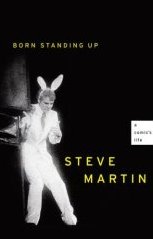Born Standing Up, Steve Martin
 Being the age that I am, my introduction to Steve Martin was
most likely through an appearance on The Muppet Show.
Not long after, I found that my father had a Steve Martin album,
A Wild and Crazy Guy, which concluded with the memorable
“King Tut.” Thus, before I really understood that
there was such a thing as “stand-up comedy,” I was
vaguely aware that the Steve Martin I would soon begin to see in
movies was a performer of some sort.
Being the age that I am, my introduction to Steve Martin was
most likely through an appearance on The Muppet Show.
Not long after, I found that my father had a Steve Martin album,
A Wild and Crazy Guy, which concluded with the memorable
“King Tut.” Thus, before I really understood that
there was such a thing as “stand-up comedy,” I was
vaguely aware that the Steve Martin I would soon begin to see in
movies was a performer of some sort.
Born Standing Up is Steve Martin's memoir of his years as a stand-up comedian: “not an autobiography but a biography, because I am writing about someone I used to know.” The narrative begins in the summer of 1965, when Steve Martin was just about to begin his life as a performer.
We're then taken back to 1950, when the Martin family moved with five-year-old Steve from Waco, Texas to Hollywood. We're then given a view into life at home and especially the cool and complex relationship between Glenn Martin and his son.
At age ten, Steve Martin secured a job selling guidebooks at Disneyland, where he could study performers plying their craft daily. Securing a position in a magic shop at Disneyland proved crucial. The hours spent demonstrating magic tricks to tourists stopping in the shop led to the development of some skill that led to performances. Changes in the magic shop proved fortunate, helping to move Steve Martin in the direction of comedy.
It has long been said that fortune favors the bold. Fortune has indeed smiled upon Steve Martin. He was bold, developing an act that was hardly conventional even for a time when unconventional was the standard convention for performers. To this, we see more added, the sort of effort and attention to detail that I would sum up succinctly in the word professional. He recorded himself for later listening. He paid attention to himself, how his props, body, and words went together. He watched how different material would work for various audiences. And he practiced, taking on a grueling schedule, show after show, day in an day out.
Finally, Steve Martin made the bigtime. It was then that he decided that he was going to get out of stand-up comedy. The thought is perhaps incomprehensible to some: why leave what you love doing when you're able at the top of the game? Another question is raised: does it follow that you wind up doing what you love simply by virtue of finding success in doing what you love? Put another way, if you love to be bold and original, can you be bold and original when most of the country is repeating catchphrases that come from your act?
Steve Martin is a man of many talents. That writing is among his talents helps to make Born Standing Up a pleasurable read, one that like much of his work also leaves room for reflection after the initial response has subsided.

